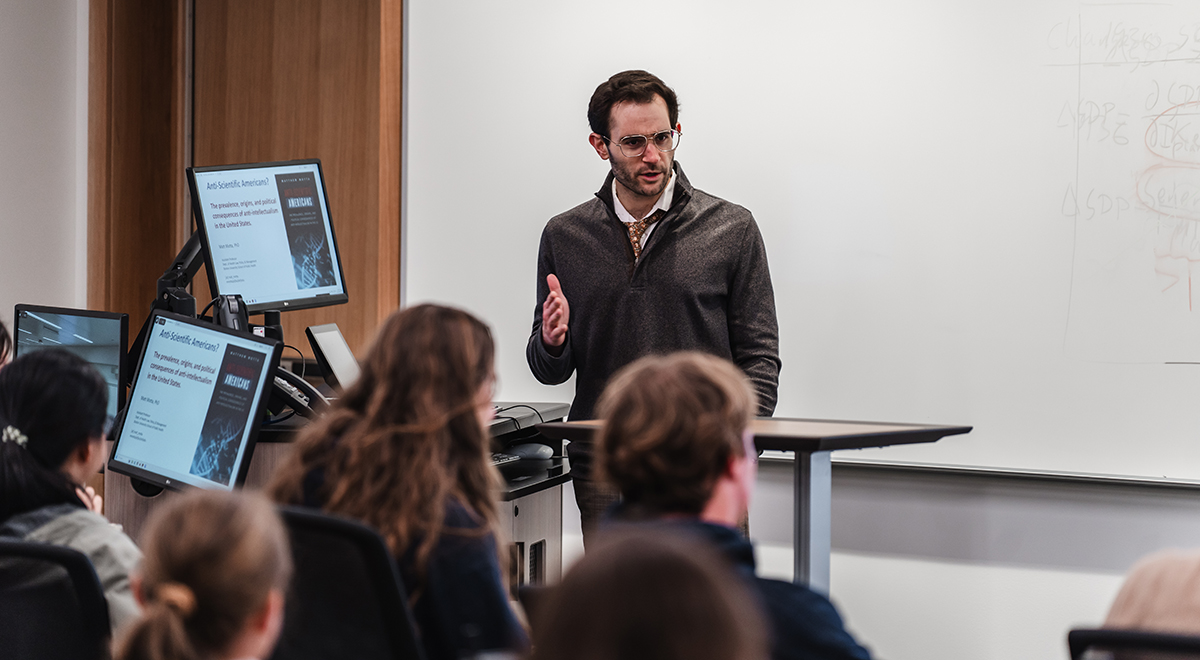Matt Motta ’13 Delivers Talk on Anti-Intellectual Beliefs and Politics

By Eliana Fiore
In an engaging lunchtime talk on Nov. 21, Matt Motta ’13, assistant professor of health law, policy, and management at Boston University’s School of Public Health, presented research findings indicating that one in three Americans harbor some degree of resentment towards scientists and other public health experts. Not only do anti-intellectual attitudes exist to that degree, but his research shows that Americans with these views may act on them.
Motta, whose new book entitled Anti-Scientific Americans: The Prevalence, Political Origins, and Political Consequences of Anti-Intellectualism in the U.S. was published in September, defines anti-intellectualism as “the distrust and dislike for individuals who can credibly claim superior knowledge about a subject.” His research focuses on identifying the social and political determinants of anti-science attitudes and investigating their health policy impact.
To a full classroom at the Frank Center for Public Affairs, Motta dove right into a hot topic in today’s headlines: “Why did Trump pick RFK, Jr. to lead the Department of Health and Human Services? Because they speak the same anti-intellectual language,” he said.
RFK, Jr. has built his political reputation on a distrust and dislike for public health experts, founding the most well-funded anti-vaccine organization in the country (Children’s Health Defense), criticizing immunologist and former Chief Medical Advisor to the President Anthony Fauci, and expressing a desire to dismantle offices such as the Food and Drug Administration, the Centers for Disease Control and Prevention, and the National Institutes of Health, according to an NBC News article Motta shared during his talk.
Motta revealed the reason why Trump would choose a figure with such views. “Anti-intellectual rhetoric on the campaign trail is used as a strategy,” he explained. “It’s a feature, not a bug for Trump to select officials that have no experience in the fields that they are running.”
Vice President-elect JD Vance echoed anti-intellectual themes during the vice presidential debate on Oct. 1, sowing distrust in experts and supporting anti-science beliefs, said Motta.
“So many of the drugs, the pharmaceuticals that we put in the bodies of our children are manufactured by nations that hate us,” Vance argued from the podium. “This has to stop. We’re not going to stop by listening to experts. We’re going to stop it by listening to common sense wisdom, which is what Donald Trump governed on.”
Motta pointed out that the phrase “common sense wisdom” is “legitimately tapping into anti-intellectual sentiment.”
Anti-intellectual attitudes did not, says Motta, originate during the Reagan and Bush eras, as many assume. He discovered that it’s a relatively new phenomenon connected to the rise of the Tea Party movement during President Obama’s tenure in the 2010s. “They attacked Obama’s intellectualism . . . [and] embraced anti-expert rhetoric as a strategic political tool,” he said.
According to Motta, individuals supporting anti-intellectual beliefs are less likely to want to regulate polluters, less concerned with climate change, more misinformed about vaccine safety, and less likely to believe that science played an important role in the pandemic.
Alarmingly, his research found that anti-intellectual public sentiment provides political officials with an incentive to support policies and legislation that dispute the legitimacy of experts’ body of knowledge.
“Anti-intellectual attitudes affect the way people think and act politically,” he concluded. “People act on these views, and politicians do, too.”

